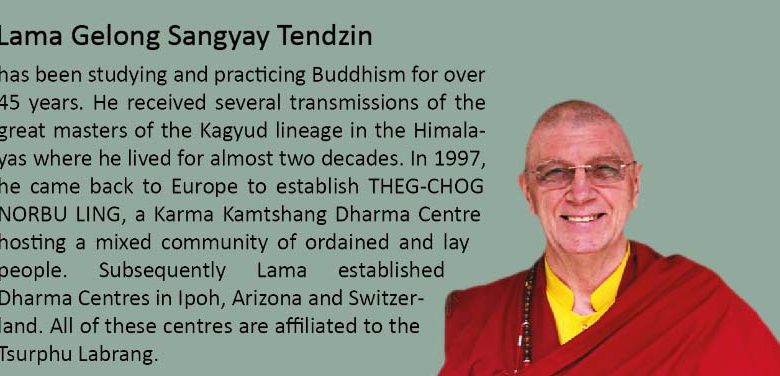

Lama Gelong Sangyay Tendzin has been practicing Buddhism for over 45 years and has received transmissions from the great masters of the Kagyud lineage in the Himalayas where he lived for almost two decades. Below are the things he spoke about while giving a talk at Tin Alley on April 30, 2023.
I am happy to be given this opportunity to share a few words of wisdom with you today and wish everyone to feel welcome and at ease.
The topic of the present discussion came from observing ways people interact in their daily relationships:
- The desire to please others often leads individuals to behave in ways that are not genuine or authentic.
- As a consequence, automatic behaviour patterns develop which are not necessarily “nice” or positive.
How does this happen? One needs to acknowledge that human behaviour is complex and multifaceted:
- The reasons behind why individuals behave in certain ways are often influenced by a range of factors, including personality traits, cultural norms, and social conditioning.
- Additionally, the definition of what is considered “nice behaviour” varies greatly depending on the individual and the cultural context in which the behaviour occurs.
- What is considered polite or appropriate in one culture or social setting may not be seen so in another.
Although the statement “be nice and don’t please” may seem at first confusing, a closer examination may reveal significant meaning and value in our daily lives:
- In essence, the statement encourages us to be kind and considerate to others without sacrificing our own needs and values to please them.
- It reminds us that being nice should not come at the expense of our own well-being or personal beliefs.
Today’s society puts a lot of pressure on individuals to please others:
- We are constantly bombarded with messages about how we should look, act, and think, often causing us to conform to societal expectations in order to gain approval and acceptance from others.
- In many cases, we sacrifice our own happiness and authenticity in order to fit in with the others’ expectations.
However, this constant need to please can be harmful to our mental health and well-being:
- Trying to meet the expectations of others at the expense of our own happiness can lead to feelings of anxiety, stress, and depression.
- Additionally, the act of constantly trying to please others can cause us to lose touch with our own sense of identity and purpose, leaving us feeling lost and unfulfilled.
On the other hand, being nice without the need to please can have many benefits:
- It allows us to cultivate genuine relationships with others, based on mutual respect and understanding, rather than just trying to gain their approval.
- It allows us to be true to ourselves and our own values, rather than sacrificing them for the sake of pleasing others.
- Ultimately, it can lead to greater happiness and fulfilment in our lives.
To truly embody the principle of being nice without the need to please, we must first understand and accept ourselves for who we are.
This means:
- Acknowledging our strengths and weaknesses,
- Acknowledging our likes and dislikes, and,
- Acknowledging our personal values and beliefs.
When we have a strong sense of self-awareness, we are better able to navigate the expectations of others without sacrificing our own well-being.
We must also learn to set boundaries in our relationships with others.
This means:
- Being clear about our own needs and values.
- Communicating them effectively to those around us.
- It means saying “no” when we need to, yet not feeling guilty or ashamed for doing so.
By setting boundaries, we are able to maintain our own sense of identity and self-worth, while still being kind and considerate to others.
Another important aspect of being nice without the need to please is developing empathy and compassion for others.
This means:
- Truly listening to others, trying to understand their perspective.
- Treating them with kindness and respect, even if we don’t agree with them.
- Being willing to help others when we can, without expecting anything in return.
Ultimately, being nice without the need to please is about:
- Finding a balance between your own needs and the needs of others.
- Being kind and considerate to others, while also staying true to yourself and your own values.
- Cultivating genuine relationships with others, based on mutual respect, and understanding, rather than just trying to gain their approval.
In conclusion, the topic “Be nice and don’t please”:
- encourages us to be kind and considerate to others without sacrificing our own well-being or personal beliefs.
- It reminds us that being nice should not come at the expense of our own happiness or authenticity.
- By developing self-awareness, setting boundaries, and cultivating empathy and compassion
For others, we can embody this principle in our daily lives, leading to greater happiness and fulfilment for ourselves and those around us.


